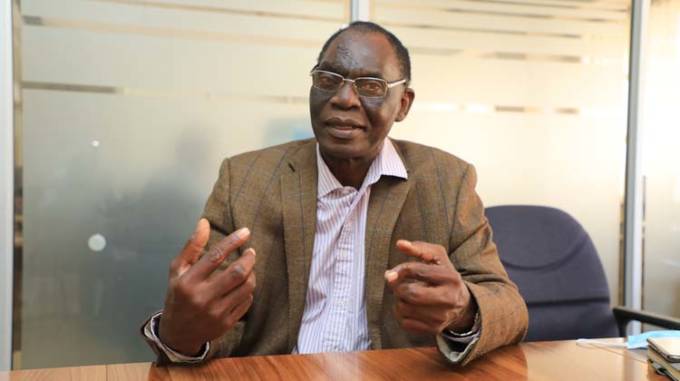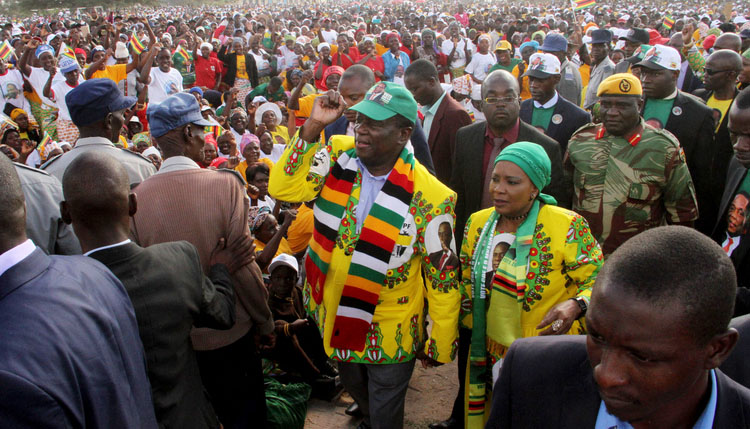
The Sunday Mail

THOUSANDS of gallant sons and daughters of Zimbabwe sacrificed their lives by engaging in open warfare on the front during the liberation struggle. Whilst they were engaged in the actual fighting in the bush, others were contributing to the war effort in various capacities at the rear. In this edition, we take a look at how educationists, who were based at the rear, “fought” during the war, and the impact their selflessness had on the outcome of the struggle. Our Senior Reporter Tendai Chara had a discussion with Cde Hoyini Samuel Bhila, who after being seriously injured in battle was no-longer capable of taking an active part in combat. He then decided to contribute to the war effort by teaching. In this instalment, Cde Bhila, whose Chimurenga name was Obey Dzingai, tells us how he skipped the border and went for military training in Mozambique.
**********

Q: Cde, if you can kindly introduce yourself to the readers and give us a brief background about yourself.
A: My name is Hoyini Samuel Bhila and I was born in Chipinge on October 28, 1952.
I did my primary education at Makoho, which is a remote school near the Mozambican border.
My parents then moved from Makoho to Chisumbanje where I completed my primary education at Chisumbanje Primary School.
In 1965, I was in Standard Three and I completed my Standard Six in 1968.
I then went to Chikore Mission where I started my Form One in 1969.
Before I go into detail, one thing that I would want to highlight is the fact that during the colonial era, the education system was called a Bottleneck System.
This meant that when you started going to primary school, your class could have, say, 100 pupils, but by the time you got to Form One, there would be less than probably 50 pupils.
There was a deliberate thorough screening and those that failed would automatically leave school.
Very few managed to go to secondary school and I was one of them.
I was at Chikore up to Form Two. Again after Form Two, those that would not have made it would automatically drop out of school.
That’s how the system operated. I then went to Mt Selinda for my Form Three, completing my “O” Level in 1972.
It was very normal for someone after completing Form Four to be out of school for some time in order to be accommodated in the few professions that blacks were allowed to go into.
Among some of the professions that were reserved for Africans were teaching, joining the police force, being a soldier and nursing.
However, only a few people would be accommodated by the system at a time.
After finishing my “O” Level, I went to Harare and did salesmanship for six months and after that I went to work in a supermarket at Tilcor, which is called Green Fuel today.
Still, working in a supermarket was not the ideal job for someone who had gone as far as “O” Level.
I worked in a supermarket because I had nowhere else to work.
During this time, teachers were respected and I decided to become one.
I then decided, in 1975, to go back to Mt Selinda to train as a teacher.
Q: How did you become a freedom fighter?
A: Mt Selinda is close to the Mozambican border and we were aware of the political developments that were taking place in that country.
Through the radio and from people who were going into and coming out of Mozambique, we learnt that Frelimo had chased the Portuguese out of that country.
On June 25 1975, Mozambique became independent and we were very much interested in knowing how Frelimo had managed to win the war.
On account of our youthfulness, we thought Frelimo had simply chased away the Portuguese and we were saying if Frelimo managed to chase away the Portuguese, why can’t we do the same with the Rhodesian whites?
I wouldn’t say we were much politically oriented, but we were youngsters who were motivated by what was happening during that time.
On the 3rd of July 1975, myself, together with my friend, Valentine Magumbo, decided to go to Mozambique to join the armed struggle.
We were not sure what was going to happen after we crossed into Mozambique.
All we wanted was to go to Mozambique, come back as fighters and chase the white man away.
We left Mt Selinda at around 2pm when everyone else had gone back to class after the lunch break.
It took us about three hours to cross into Mozambique and we arrived at Espungabera.
When we were at Mt Selinda, we would see planes landing and leaving Espungabera.
So we thought those were the planes that were going to take us to where we were going to be trained.
When we got to Espungabera, we realised that there were other youngsters who had volunteered to join the war.
From the teacher training institute, I was the only one who had forfeited my studies.
As was the norm, I was interviewed by the governor of Espungabera.
When I told the governor that I was training as a teacher, he tried to entice me to become a teacher in Mozambique.
The governor regarded me as a highly educated youngster and was determined to have me as an English teacher in Mozambique.
He offered to pay me good money.
Q: Did you take the offer?
A: No! I was not interested in money. I had a mission to complete. I rejected his offer and moved on.
Q: What happened next?
A: More and more people were joining us at Espungabera and the authorities decided to take us to a camp called Machazi.
When I arrived at Machazi, there were around 50 of us but within months, the numbers grew to seven thousand.
On arrival at Machazi, one was required to surrender all the personal belongings.
We had to surrender everything — wristwatches and identity particulars until you were left without any personal belongings.
We were registered in a black book.
Apparently, I was given the task of registering everyone who was entering the camp.
I was a camp secretary of some sort.
I operated from a small hut which we called a poshto.
During the registration exercise, that is when we were supposed to come up with Chimurenga names.
I called myself Obey Dzingai.
The name Obey was drawn from the fact that when you become a soldier, you have to obey orders from your seniors and this is from where we have the song Nzira dzemasoja.
I gave myself the surname Dzingai, meaning dzingai mabhunu (chase away the whites).
Q: From Machazi, where did you go?
A: We were then moved to a bigger camp.
This wasn’t a camp as such, actually there was nothing, it was just a bush.
We started building thatched barracks using logs and bamboos.
Don’t miss our next instalment where Cde Dzingai talks about military training and the subsequent deployment to the war front.






